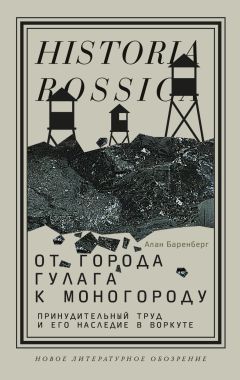
Автор книги: Алан Баренберг
Жанр: Документальная литература, Публицистика
Возрастные ограничения: +16
сообщить о неприемлемом содержимом
Текущая страница: 24 (всего у книги 24 страниц)
Dallin D. J., Nikolaevsky B. I. Forced Labor in Soviet Russia. New Haven: Yale University Press, 1947.
Dobson M. Khrushchev’s Cold Summer: Gulag Returnees, Crime, and the Fate of Reform after Stalin. Ithaca: Cornell University Press, 2009.
Dobson M. «Show the Bandit-Enemies No Mercy!»: Amnesty, Criminality and Public Response in 1953 // The Dilemmas of De-Stalinization: Negotiating Cultural and Social Change in the Khrushchev Era / Ed. P. Jones. London: Routledge, 2006. P. 21–40.
Edele M. Soviet Veterans of the Second World War: A Popular Movement in an Authoritarian Society, 1941–1991. Oxford; New York: Oxford University Press, 2008.
Elie M. Ce que réhabiliter veut dire // Vingtième Siècle. Revue d’histoire. 2010. № 107. P. 101–113.
Elie M. Khrushchev’s Gulag // The Thaw: Soviet Society and Culture in the 1950s and 1960s / Ed. by E. Gilburd, D. Kozlov. Toronto: University of Toronto Press, 2013. P. 109–142.
Elie M. Les anciens détenus du Goulag: libérations massives, réinsertion et réhabilitation dans l’URSS poststalinienne, 1953–1964. Ph.D. thesis, EHESS, 2007.
Elie M. Les politiques à l’égard des libérés du Goulag // Cahiers du monde russe. 2006. Vol. 47. № 1–2. P. 327–348.
Ertz S. Trading Effort for Freedom: Workday Credits in the Stalinist Camp System // Comparative Economic Studies. 2005. Vol. 47. № 2. P. 476–491.
Fakiolas R. Problems of Labour Mobility in the USSR // Soviet Studies. 1962. Vol. 14. № 1. P. 16–40.
Figes O. The Whisperers: Private Life in Stalin’s Russia. New York: Metropolitan Books, 2007.
Filtzer D. From Mobilized to Free Labour: De-Stalinization and the Changing Legal Status of Workers // The Dilemmas of De-Stalinization: Negotiating Cultural and Social Change in the Khrushchev Era / Ed. P. Jones. London: Routledge, 2006. P. 154–169.
Filtzer D. Soviet Workers and De-Stalinization: The Consolidation of the Modern System of Soviet Production Relations, 1953–1964. Cambridge: Cambridge University Press, 1992.
Filtzer D. Soviet Workers and Late Stalinism: Labour and the Restoration of the Stalinist System after World War II. Cambridge: Cambridge University Press, 2002.
Filtzer D. Soviet Workers and Stalinist Industrialization: The Formation of Modern Soviet Production Relations, 1928–1941. Armonk, NY: M. E. Sharpe, 1986.
Fitzpatrick Sh. Everyday Stalinism. New York: Oxford University Press, 1999.
Fitzpatrick Sh. Postwar Soviet Society: The «Return to Normalcy», 1945–1953 // The Impact of World War II on the Soviet Union / Ed. S. J. Linz. Totowa, NJ: Rowman & Allanheld, 1985. P. 129–156.
Fitzpatrick Sh. Stalin’s Peasants: Resistance and Survival in the Russian Village after Collectivization. New York: Oxford University Press, 1994.
Fitzpatrick Sh. Tear off the Masks!: Identity and Imposture in Twentieth-century Russia. Princeton, NJ: Princeton University Press, 2005.
Fitzpatrick Sh. War and Society in Soviet Context: Soviet Labor before, during, and after World War II // International Labor and Working-Class History. 1989. Vol. 35. P. 37–52.
Gentes A. A. Exile to Siberia, 1590–1822: Corporeal Commodification and Administrative Systematization in Russia. New York: Palgrave Macmillan, 2008.
Getty J. A., Rittersporn G. T., Zemskov V. N. Victims of the Soviet Penal System in the Pre-War Years: A First Approach on the Basis of Archival Evidence // American Historical Review. 1993. Vol. 98. № 4. P. 1017–1049.
Glantz D. M. The Battle for Leningrad: 1941–1944. Lawrence: University Press of Kansas, 2002.
Gorlizki Y., Khlevniuk O. V. Cold Peace: Stalin and the Soviet Ruling Circle, 1945–1953. New York: Oxford University Press, 2004.
Goudoever A. P. van. The Limits of Destalinization in the Soviet Union: Political Rehabilitations in the Soviet Union since Stalin. New York: St. Martin’s Press, 1986.
Graziosi A. The Great Strikes of 1953 in Soviet Labor Camps in the Accounts of Their Participants: A Review // Cahiers du monde russe et sovietique. 1992. Vol. 33. № 4. P. 419–446.
Hardy J. S. Gulag Tourism: Khrushchev’s «Show» Prisons in the Cold War Context, 1954–59 // The Russian Review. 2012. Vol. 71. № 1. P. 49–78.
Hardy J. S. «The Camp Is Not a Resort»: The Campaign against Privileges in the Soviet Gulag, 1957–61 // Kritika: Explorations in Russian and Eurasian History. 2012. Vol. 13. № 1. P. 89–122.
Harris J. R. The Great Urals: Regionalism and the Evolution of the Soviet System. Ithaca, NY: Cornell University Press, 1999.
Harris S. E. «I Know All the Secrets of My Neighbors»: The Quest for Privacy in the Era of the Separate Apartment // Borders of Socialism: Private Spheres of Soviet Russia // Ed. L. H. Siegelbaum. Gordonsville, VA, USA: Palgrave Macmillan, 2006. P. 171–189.
Hauslohner P. A. Managing the Soviet Labor Market: Politics and Policymaking under Brezhnev. Ph.D. thesis, The University of Michigan, 1984.
Heinzen J. Corruption in the Gulag: Dilemmas of Officials and Prisoners // Comparative Economic Studies. 2005. Vol. 47. № 2. P. 456.
Jakobson M. Origins of the Gulag: The Soviet Prison Camp System, 1917–1934. Lexington: University Press of Kentucky, 1993.
Kassof A. The Soviet Youth Program: Regimentation and Rebellion. Cambridge: Harvard University Press, 1965.
Khlevniuk O. V. The History of the Gulag: From Collectivization to the Great Terror. New Haven: Yale University Press, 2004.
Kibita N. Moscow – Kiev Relations and the Sovnarkhoz Reform // Khrushchev in the Kremlin: Policy and Government in the Soviet Union, 1953–1964 / Ed. by M. Ili’c, J. Smith. New York, NY: Routledge, 2011. P. 94–111.
Kizny T., Lloyd-Jones A. Gulag: Solovki, the White Sea Canal, the Vaigach Expedition, the Theater in the Gulag, Kolyma, Vorkuta, the Road of Death. Buffalo, NY: Firefly Books, 2004.
Kotkin S. Magnetic Mountain: Stalinism as a Civilization. Berkeley: University of California Press, 1995.
Lahusen T. How Life Writes the Book: Real Socialism and Socialist Realism in Stalin’s Russia. Ithaca, NY: Cornell University Press, 1997.
Leem K. H. Labor Solidarity and Militancy in Post-communist Russia: Coal Miners and Railroad Workers in Kuzbass and Vorkuta. Ph.D. thesis, The University of Chicago, 1996.
Leong A. Centaur: The Life and Art of Ernst Neizvestny. Lanham: Rowman & Littlefield, 2002.
Malle S. Planned and Unplanned Mobility in the Soviet Union under the Threat of Labour Shortage // Soviet Studies. 1987. Vol. 39. № 3. P. 357–387.
Merridale C. Night of Stone: Death and Memory in Russia. London: GRANTA, 2000.
Negretov P. I. How Vorkuta Began // Soviet Studies. 1977. Vol. 29. № 4. P. 565–575.
Nordlander D. J. Capital of the Gulag: Magadan in the Early Stalin Era, 1929–1941. Ph.D. thesis, The University of North Carolina at Chapel Hill, 1997.
Nordlander D. J. Idealistic Birth and Painful Infancy: Magadan before the Gulag, 1929–1932 // Soviet and Post-Soviet Review. 1996. Vol. 23. № 2. P. 203–227.
Nordlander D. J. Origins of a Gulag Capital: Magadan and Stalinist Control in the Early 1930s // Slavic Review. 1998. Vol. 57. № 4. P. 791–812.
Nove A. An Economic History of the U. S. S. R., 1917–1991. 3rd ed. New York: Penguin Books, 1992.
Pallot J. Forced Labour for Forestry: The Twentieth-Century History of Colonisation and Settlement in the North of Perm’ Oblast’ // Europe-Asia Studies. 2002. Vol. 54. № 7. P. 1055–1084.
Pallot J. Russia’s Penal Peripheries: Space, Place and Penalty in Soviet and Post-Soviet Russia // Transactions of the Institute of British Geographers. 2005. Vol. 30. № 1. P. 98–112.
Pallot J., Piacentini L., Moran D. Patriotic Discourses in Russia’s Penal Peripheries: Remembering the Mordovan Gulag // Europe-Asia Studies. 2010. Vol. 62. № 1. P. 1–33.
Pilkington H. Beyond «Peer Pressure»: Rethinking Drug Use and «Youth Culture» // International Journal of Drug Policy. 2007. Vol. 18. № 3. P. 213–224.
Pilkington H. «For Us It Is Normal»: Exploring the «Recreational» Use of Heroin in Russian Youth Cultural Practice // Journal of Communist Studies & Transition Politics. 2006. Vol. 22. № 1. P. 24–53.
Pilkington H. No Longer «On Parade»: Style and the Performance of Skinhead in the Russian Far North // Russian Review. 2010. Vol. 69. № 2. P. 187–209.
Pohl J. O. The Stalinist Penal System: A Statistical History of Soviet Repression and Terror, 1930–1953. Jefferson, NC: McFarland, 1997.
Pohl M. The Virgin Lands between Memory and Forgetting: People and Transformation in the Soviet Union, 1954–1960. Ph.D. thesis, The Indiana University, 1999.
Roeder B. Katorga: An Aspect of Modern Slavery. London: Heinemann, 1958.
Shearer D. R. Policing Stalin’s Socialism: Repression and Social Order in the Soviet Union, 1924–1953. New Haven, Stanford, Calif.: Yale University Press; Hoover Institution, Stanford University, 2009.
Smith K. E. Remembering Stalin’s Victims: Popular Memory and the End of the USSR. Ithaca, NY: Cornell University Press, 1996.
Smith M. B. Property of Communists: The Urban Housing Program from Stalin to Khrushchev. DeKalb: Northern Illinois University Press, 2010.
Solomon P. H. Soviet Criminal Justice Under Stalin. New York: Cambridge University Press, 1996.
Statiev A. The Soviet Counterinsurgency in the Western Borderlands. New York: Cambridge University Press, 2010.
Swianiewicz S. Forced Labour and Economic Development. London: Oxford University Press, 1965.
Taubman W. Governing Soviet Cities: Bureaucratic Politics and Urban Development in the USSR. New York: Praeger, 1973.
Taubman W. Khrushchev: The Man and His Era. New York: W. W. Norton, 2003.
The Dilemmas of De-Stalinization: Negotiating Cultural and Social Change in the Khrushchev Era / Ed. P. Jones. London: Routledge, 2006.
The Economics of Forced Labor: The Soviet Gulag / Ed. by P. R. Gregory, V. V. Lazarev. Stanford, California: Hoover Institution Press, 2003.
Varese F. The Russian Mafia: Private Protection in a New Market Economy. New York: Oxford University Press, 2001.
Varese F. The Society of the Vory-v-zakone, 1930s – 1950s // Cahiers du monde russe. 1998. Vol. 39. № 4. P. 515–538.
Viola L. Stalin’s Empire: The Gulag and Police Colonization in the Soviet Union in the 1930s // Stalinism and Europe: Terror, War, Domination, 1937–1947 / Ed. by T. Snyder, R. Brandon. New York: Oxford University Press, 2014. P. 18–43.
Viola L. The Unknown Gulag: The Lost World of Stalin’s Special Settlements. New York: Oxford University Press, 2007.
Volkov V. Violent Entrepreneurs: The Use of Force in the Making of Russian Capitalism. Ithaca: Cornell University Press, 2002.
Weiner A. The Empires Pay a Visit: Gulag Returnees, East European Rebellions, and Soviet Frontier Politics // Journal of Modern History. 2006. Vol. 78. № 2. P. 333–376.
Werth N. L’amnistie du 27 mars 1953. La premiere grande sortie du Goulag // Communisme. 1995. № 42/43/44. P. 211–223.
Wolff D., Moullec G. Le KGB et les Pays baltes: 1939–1991. Paris: Belin, 2005.
Zaslavsky V. The Neo-Stalinist State: Class, Ethnicity, and Consensus in Soviet Society. Armonk, NY: M. E. Sharpe, 1994.
Zubkova E. Russia after the War: Hopes, Illusions, and Disappointments, 1945–1957. Armonk, NY: M. E. Sharpe, 1998.
Zubok V. M. Zhivago’s Children: The Last Russian Intelligentsia. Cambridge, MA: Belknap Press of Harvard University Press, 2009.
Правообладателям!
Это произведение, предположительно, находится в статусе 'public domain'. Если это не так и размещение материала нарушает чьи-либо права, то сообщите нам об этом.








































